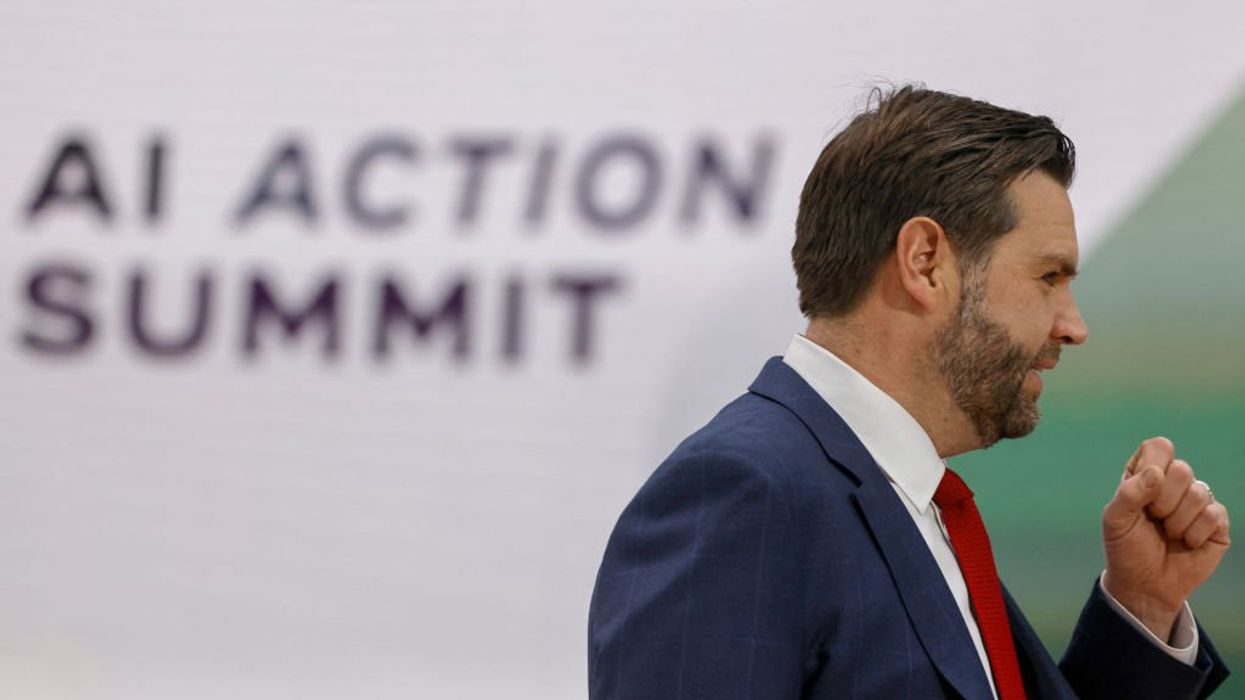
Photo by LUDOVIC MARIN/AFP via Getty Images

The vice president declared at the Paris AI Summit that social media and AI systems in the US will remain free from ideological control, vowing to protect online free speech.
Vice President JD Vance’s inaugural overseas trip on Feb. 11 conveyed a clear message to our European allies. A new sheriff is in town, and the days of the federal government allowing European bureaucrats to abuse Americans’ free speech rights are over.
The European Union’s relentless drive to control speech, dissent, and technology is well documented. The EU’s Digital Services Act, enacted in 2022, empowers EU officials to pressure American social media companies into removing content deemed “illegal” or “harmful.”
Vance deserves plaudits for assuring the nation that the Trump administration is committed to ensuring that the digital square continues to be a force for prosperity and freedom.
From urging social media companies to censor “disinformation” to working to make the answers provided by artificial intelligence politically charged, the European Union shows little regard for freedom of speech, both for its own citizens and those of the United States.
It's easier for companies to establish a single set of standards around issues — like content moderation — than to have specific rules for each operating country. This phenomenon, now called the “Brussels effect,” is causing platforms to frequently remove posts pre-emptively, shadow-ban dissenting voices, and algorithmically suppress content to comply with EU regulations, even when such speech is lawful in the United States. In other words, the EU is effectively exporting its speech restrictions worldwide, compelling U.S. platforms to enforce European censorship standards and threatening free expression in America.
The Biden administration regularly censored American voices, so it’s no surprise that it remained silent when the EU implemented policies restricting free expression. These policies aligned with its own agenda, so why would it object?
Like the EU, the Biden White House sought to limit and control the growing AI industry. The administration specifically targeted AI-driven management software in the housing and hospitality industries. The infamously partisan Biden Justice Department claimed these AI programs allowed companies to collude and raise prices. But evidence shows the technology automatically adjusts prices based on market conditions, often lowering costs when inflationary pressures ease.
Fortunately, during his Feb. 11 speech at the Paris Artificial Intelligence Summit, Vance took a hard line.
Vance declared that social media platforms and AI systems developed in the U.S. would remain free from ideological constraints. “We will never restrict our citizens’ right to free speech,” he pledged. He also affirmed the U.S. commitment to AI as a driver of competition and economic growth, vowing to stop overzealous bureaucrats from stifling innovation.
The Trump administration’s strong stance against free speech violations is encouraging. The challenge now is ensuring that these ideals become political reality.
First, the Justice Department and Federal Trade Commission should investigate any anticompetitive behavior driven by international regulatory pressure. If social media giants are colluding with foreign governments to suppress certain viewpoints, federal authorities must intervene to protect users’ rights.
To prevent covert compliance with EU regulations, the Trump-Vance Federal Communications Commission should strengthen transparency requirements for content moderation. Platforms must disclose when and why content is removed, preventing hidden censorship influenced by foreign bureaucrats.
Finally, Trump’s Department of Commerce should use trade agreements to block the EU from using regulatory pressure to dictate how American companies operate. By incorporating digital free speech protections into trade negotiations, the Trump administration can ensure that U.S. businesses are not forced to choose between European market access and their commitment to the First Amendment.
Vance deserves plaudits for assuring the nation that the Trump administration is committed to ensuring that the digital square continues to be a force for prosperity and freedom — not a scapegoat for regulators eager to impose control. Now, he just needs to make sure that the Trump-Vance executive agencies get to work — and soon.
They have their work cut out for them.
Ken Blackwell